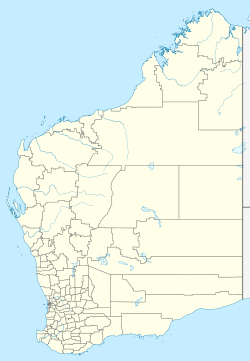Muchea Tracking Station facts for kids
Quick facts for kids Muchea Tracking Station |
|
|---|---|
| Part of Manned Space Flight Network | |
| Muchea, Western Australia | |
|
Location of Muchea Tracking Station
|
|
| Coordinates | 31°36′12.24″S 115°55′49.80″E / 31.6034000°S 115.9305000°E |
| Type | Tracking station |
| Site information | |
| Controlled by | Weapons Research Establishment, Australian Department of Supply |
| Site history | |
| In use | March 1961 – February 1964 |
The Muchea Tracking Station was a special ground station in Australia. It was built to help NASA with its early space missions, especially Project Mercury. This station was located near Muchea, Western Australia, which is about 60 kilometers (37 miles) north of Perth, Western Australia.
Contents
Muchea's Role in Space History
The Muchea Tracking Station started operating in March 1961. It was one of 14 stations around the world that formed the Manned Space Flight Network. This network helped NASA keep track of its spacecraft and astronauts. Muchea was known as Station No. 8. The only other Australian station in this network was Station No. 9, located at Woomera in South Australia. The Australian Department of Supply managed and ran these stations for NASA.
How Muchea Tracked Spacecraft
Muchea had advanced equipment to communicate with spacecraft. It used a special radar system called "VERLORT," which stood for "VERy LOng Range Tracking." This radar could track objects up to 4,000 kilometers (2,500 miles) away! It was an improved version of an older radar, with a larger dish that was 3 meters (10 feet) wide.
The station also had systems to receive data from space (called telemetry) and to talk to the astronauts in their capsules. Because of its important location, almost directly opposite Cape Canaveral in Florida, Muchea was also able to send commands to the spacecraft. All the information about the spacecraft's position was automatically sent to NASA's Goddard Space Flight Center using a special machine called a teleprinter.
Astronauts and Communications
During each space mission, a team from NASA would come to Muchea. This team usually included two flight controllers and a doctor. The main flight controller was often another astronaut. This person acted as the "capsule communicator" (CAPCOM), which meant they were the main person who spoke directly with the astronauts in space.
A special moment happened on February 20, 1962. A Muchea Communications Technician named Gerry O'Connor became the first Australian to speak with an astronaut in space. He talked to John Glenn while Glenn was orbiting Earth aboard his spacecraft, Friendship 7. A small plaque at the station marks the exact spot where this historic conversation took place.
The End of an Era
The Muchea Tracking Station closed in February 1964. This was after Project Mercury, NASA's first human spaceflight program, had finished. Another station, the Carnarvon Tracking Station, took its place for later missions like Project Gemini and Project Apollo. Even though the Muchea station is no longer there, the local government area, the Shire of Chittering, has a small display about its history.
Missions Supported by Muchea
The Muchea Tracking Station played a key role in several important Project Mercury missions. Here are the missions it helped support:
| Date | Mission | Crew | Orbits | Senior Flight Controller |
|---|---|---|---|---|
| 13 September 1961 | MA4 | Unmanned | 1 | Scott Carpenter |
| 29 November 1961 | MA5 | Enos (a chimpanzee) | 2 | Wally Schirra |
| 20 February 1962 | MA6 | John Glenn | 3 | Gordon Cooper |
| 24 May 1962 | MA7 | Scott Carpenter | 3 | Deke Slayton |
| 3 October 1962 | MA8 | Wally Schirra | 6 | Eugene Duret |
| 15–16 May 1963 | MA9 | Gordon Cooper | 22 | Chuck Lewis |
 | Charles R. Drew |
 | Benjamin Banneker |
 | Jane C. Wright |
 | Roger Arliner Young |


